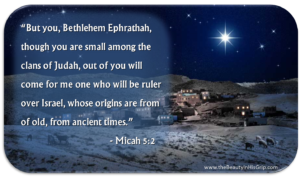Martin Luther used Micah 5:2 as his text in his second sermon given on Epiphany 1532. Below is an excerpt.
 However, the prophet elaborates further, stating what kind of king or ruler this child would be: “The ruler who is to come out of Bethlehem will be a lord over my people Israel.” This is spoken relative to the nature of Christ’s kingdom, as we have heard, that he is a King over God’s people and his kingdom is a kingdom of grace. But when he continues, “whose goings forth have been from of old, from everlasting,” it describes his person, who precisely the person of this King would be. He is to be a king and ruler over God’s people, originating in Bethlehem; however, his going forth has been from days immemorial, that is, even before the world existed, from everlasting.
However, the prophet elaborates further, stating what kind of king or ruler this child would be: “The ruler who is to come out of Bethlehem will be a lord over my people Israel.” This is spoken relative to the nature of Christ’s kingdom, as we have heard, that he is a King over God’s people and his kingdom is a kingdom of grace. But when he continues, “whose goings forth have been from of old, from everlasting,” it describes his person, who precisely the person of this King would be. He is to be a king and ruler over God’s people, originating in Bethlehem; however, his going forth has been from days immemorial, that is, even before the world existed, from everlasting.
This the scribes did not tell King Herod; indeed, they themselves did not understand or believe it, for it was somewhat more obscure than what was first stated; that he was to be born at Bethlehem and govern the people of Israel. It was important to know this, for it was a sure indication that he had to be a man. But when the prophecy further states, “his goings forth have been from of old, from everlasting,” his is not so easily comprehended, for that is tantamount to saying that he also is everlasting God and did not originate first at Bethlehem but existed from eternity.
He is to be Lord and go forth from Bethlehem. This can mean nothing else than that this ruler is true man. For Bethlehem is a city, a worldly, geographical location, visible to the eye and a place to be lived in. Since this ruler is to go forth from Bethlehem, he was to be born there, like anyone else born in a city. If Bethlehem is his birthplace, then he is a natural, true man. Moreover, if he is to be ruler over the people of Israel, he certainly must be a human King and Lord, have flesh and blood, body and soul just like any other man, otherwise he could not be Lord over the people of Israel. The prophet states further, “His going forth is even before the days of the world came into existence,” that is, his going forth is from eternity. This King does not first originate with his birth at Bethlehem. That is indeed his birthplace, his place of origin; but in addition to this origination, he has yet another going forth, namely, before the world began, from eternity, before days were counted. So when we acknowledge that he issues forth at Bethlehem, we must also acknowledge his going forth before the beginning of time, from eternity.
Martin Luther Sermons of Martin Luther: The House Postils, v. 1 (edited by Eugene F. A. Klug) 209-210
